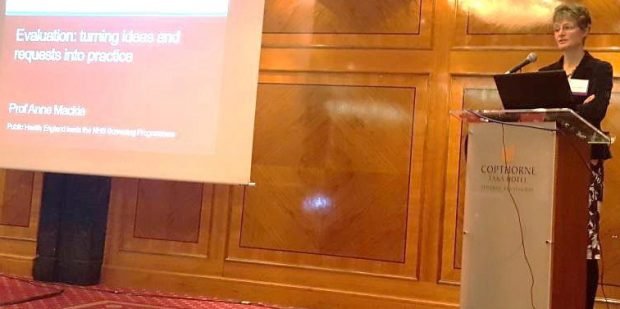Last month we held the 2017 UK National Screening Committee (UK NSC) stakeholder event.
Learning from the experience of the previous 2 events, this year we invited our third sector colleagues from patient groups, charities, royal colleges and other external organisations.
This gave these stakeholders the chance to engage with the committee and network with each other. There were practical examples that demonstrated the UK NSC processes and thankfully the presentations all went without any technical hitches this year!

Firstly, we heard from the UK NSC Chair, Professor Bob Steele. He laid the foundations for the day by talking through what the UK NSC means when it refers to screening and described the kinds of challenges we face as a committee.
Prof Steele emphasised that screening can do harm as well as good. That is why the committee reviews all the evidence before making recommendations to ensure that our screening programmes do more good than harm at a population level.
Turning ideas into practice
Professor Anne Mackie, Director of PHE Screening, talked about the processes we use when considering a proposal for a screening programme and provided us with practical examples of how the UK NSC turns ideas and requests into practice.
This was one of the areas stakeholders had asked us to explain in more detail in 2016.
Facilitating informed choices in screening
Informed choice is one of the fundamental principles in screening. We offer screening to eligible people and it is their choice whether to accept or decline that offer based on the potential benefits and harms.
Dr Louise Bryant, Professor in Medical Psychology from the University of Leeds, was keen to stress that “alternative views exist on screening tests”. Although we offer screening, we know that it is not accepted by all.
We continue to work hard to make sure people can make informed choices. This means the written and verbal information and training we produce has to be accessible and balanced.
Tackling inequalities in screening
Finally, Dr Sunil Bhanot provided a heartfelt presentation on tackling health inequalities. We learned that “health inequalities are systematic, avoidable and unjust” and he told us about the steps that public health bodies take to try to address them.
All in all, it was a highly informative day that focused on the ways we develop our screening programmes and how we review and modify them in the changing world. We would like to thank everyone for attending, and would also like to wish you all a very Merry Christmas and a happy New Year!
Visit GOV.UK for more information about the UK NSC and how to engage with the evidence review process.
UK NSC blog
The UK NSC blog provides up to date news from the UK National Screening Committee. You can register to receive updates direct to your inbox, so there’s no need to keep checking for new articles. If you have any questions about this blog article, or about the work of the UK NSC, please contact the UK NSC helpdesk.
Leave a comment